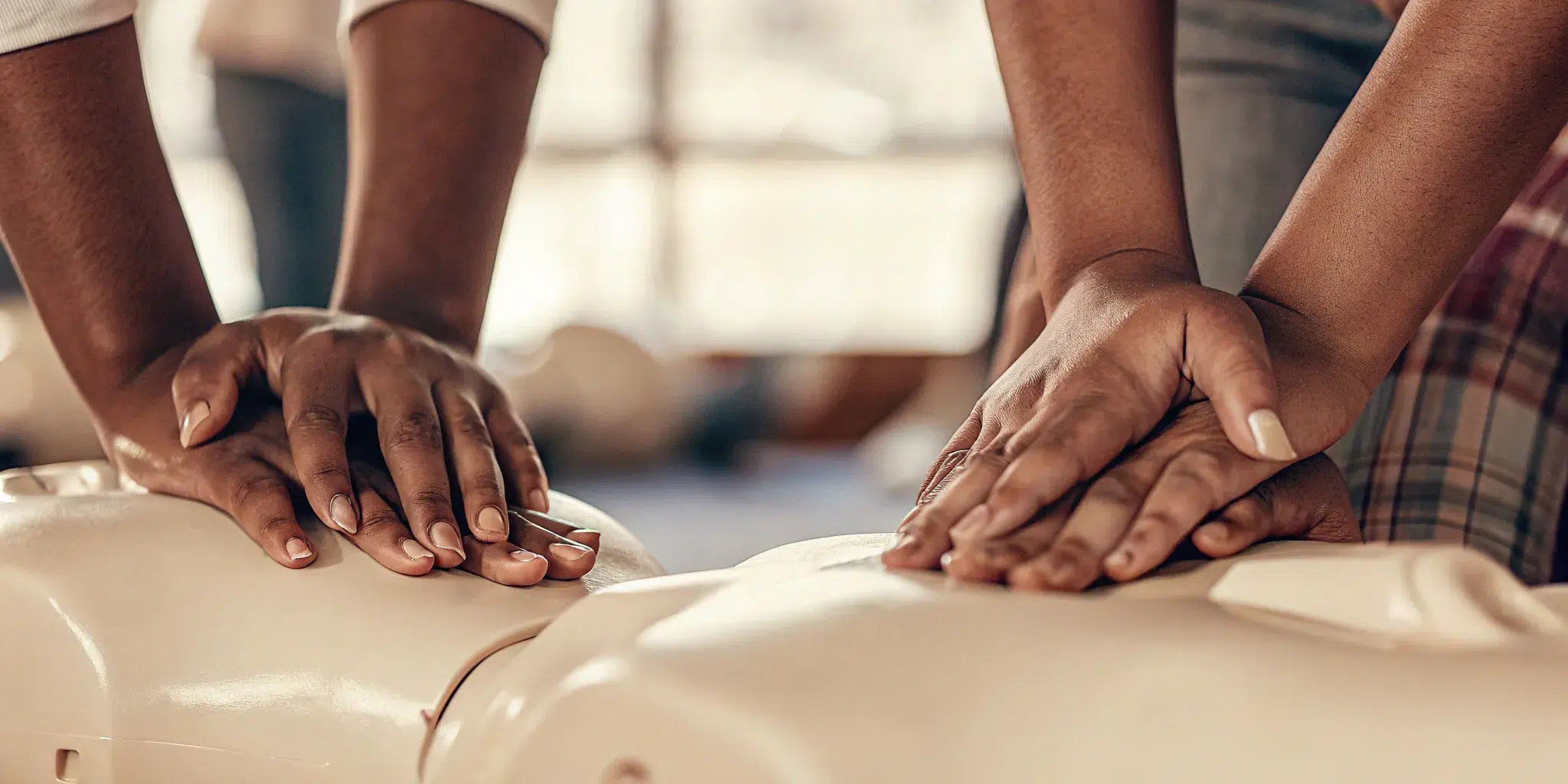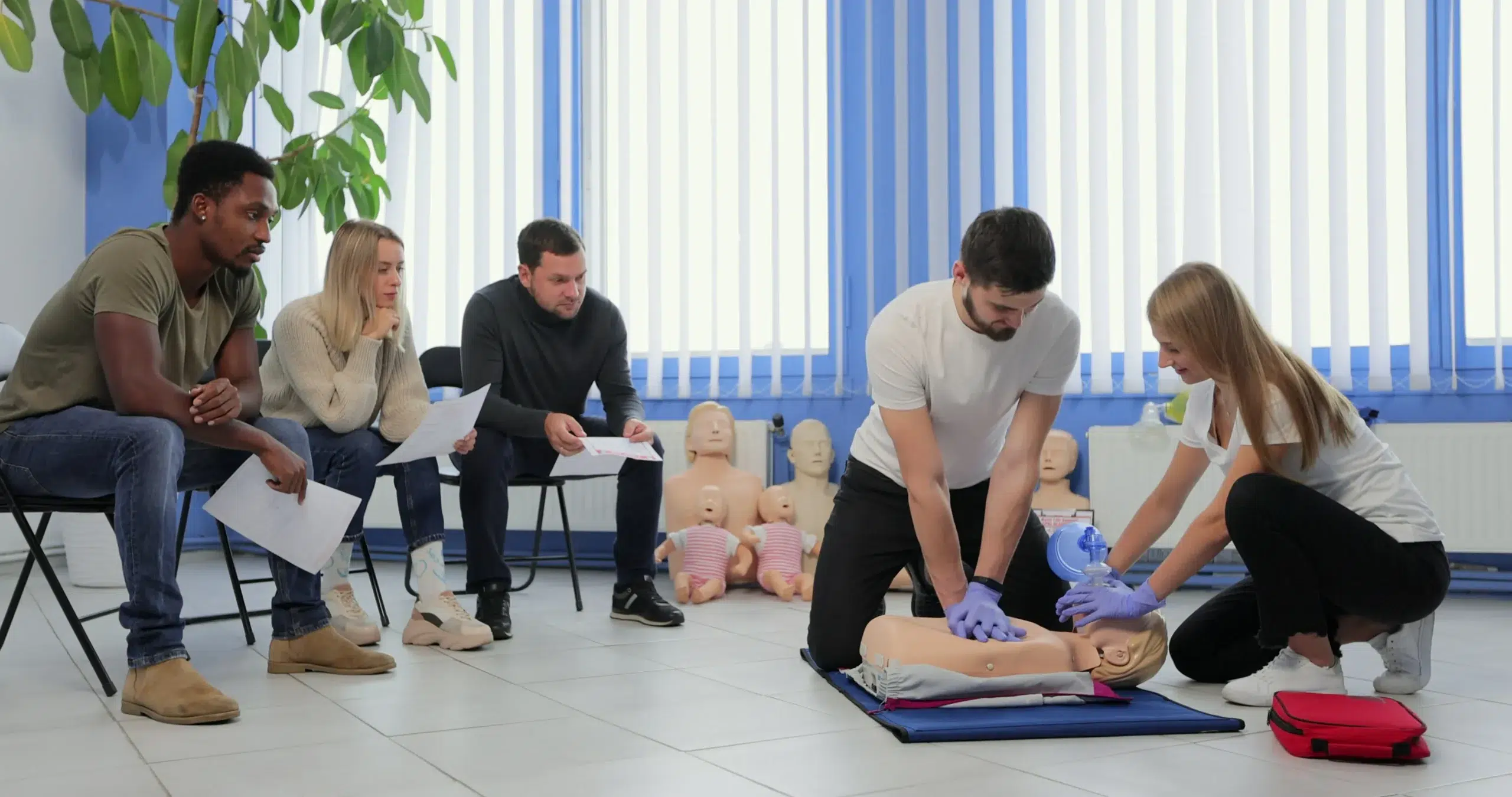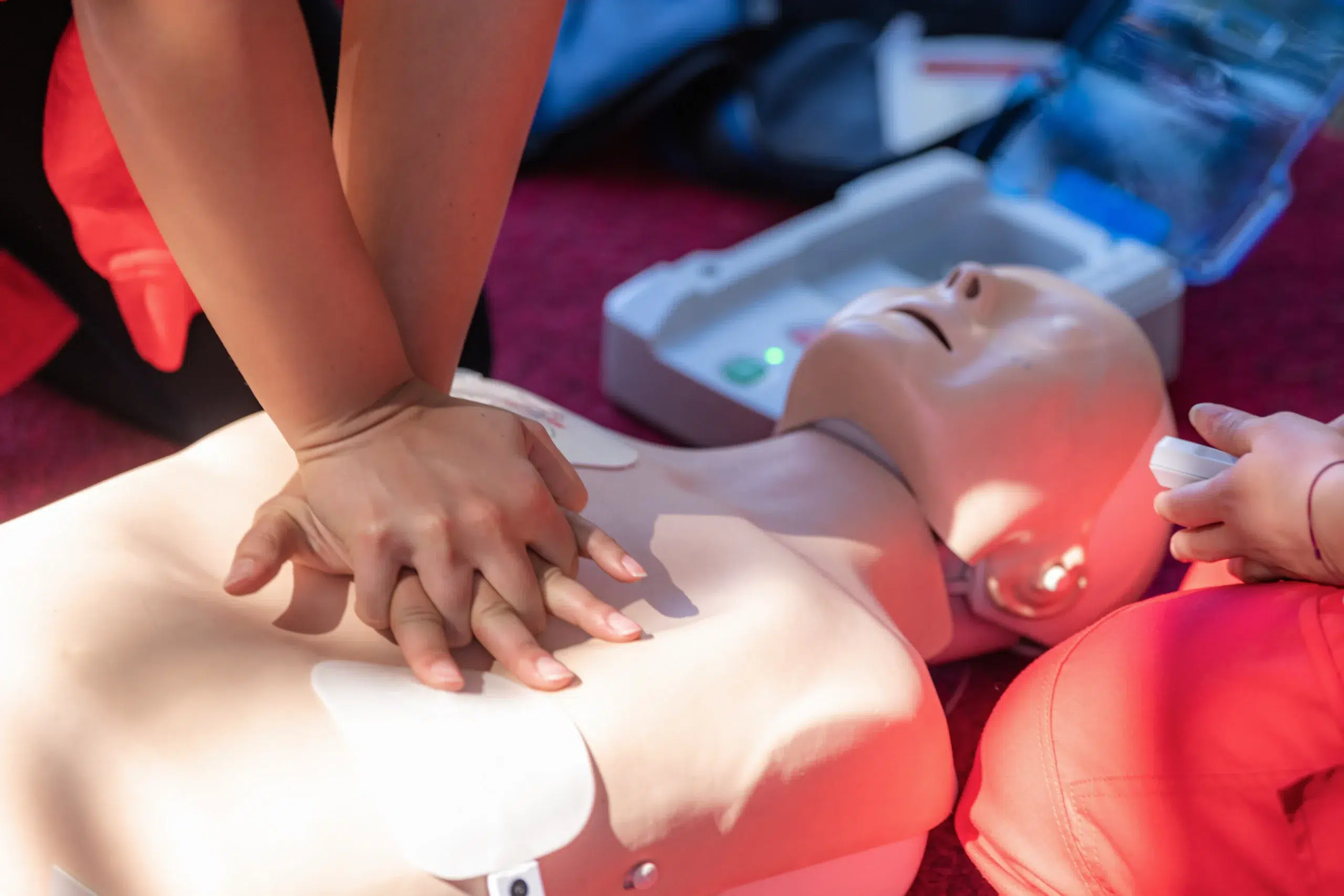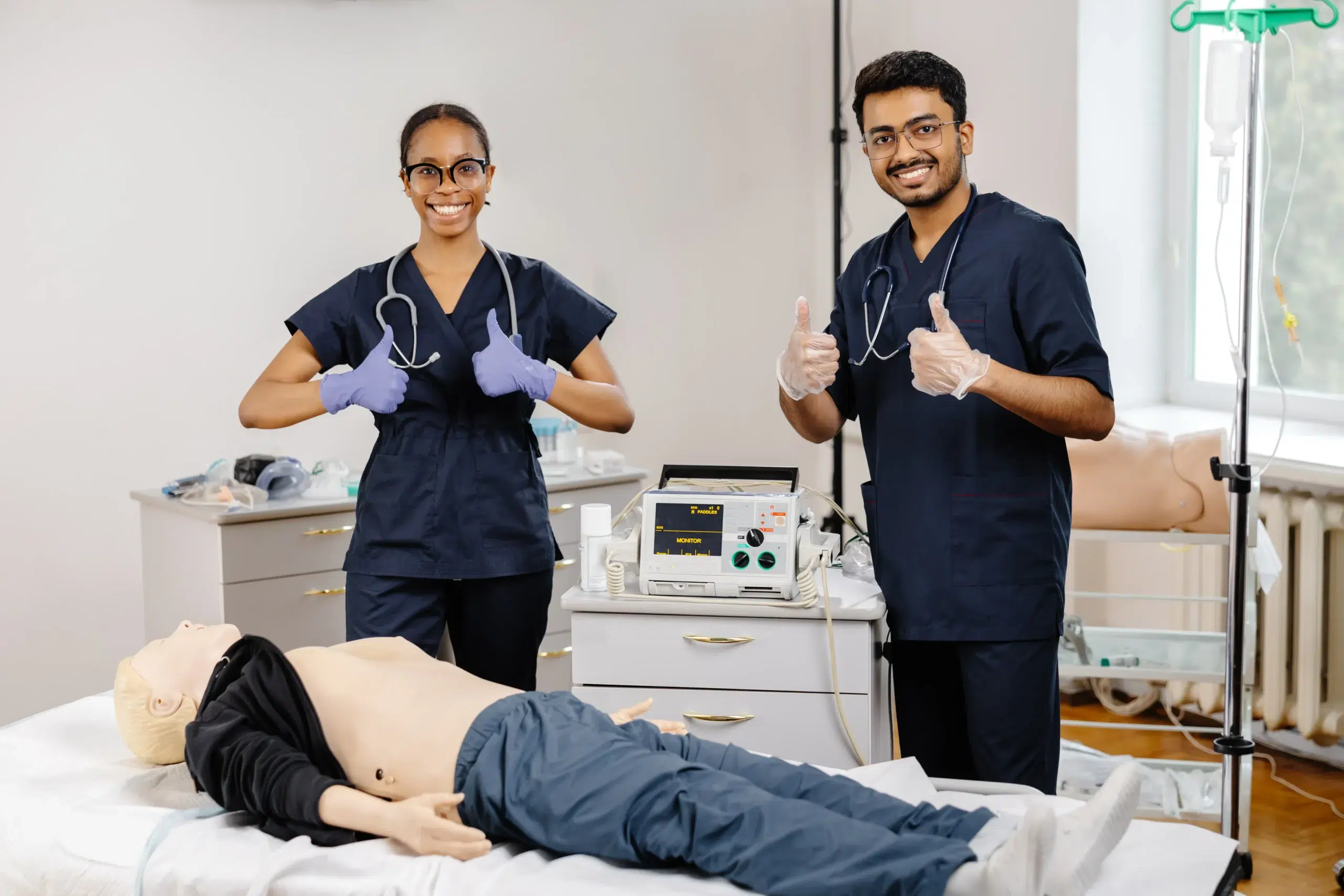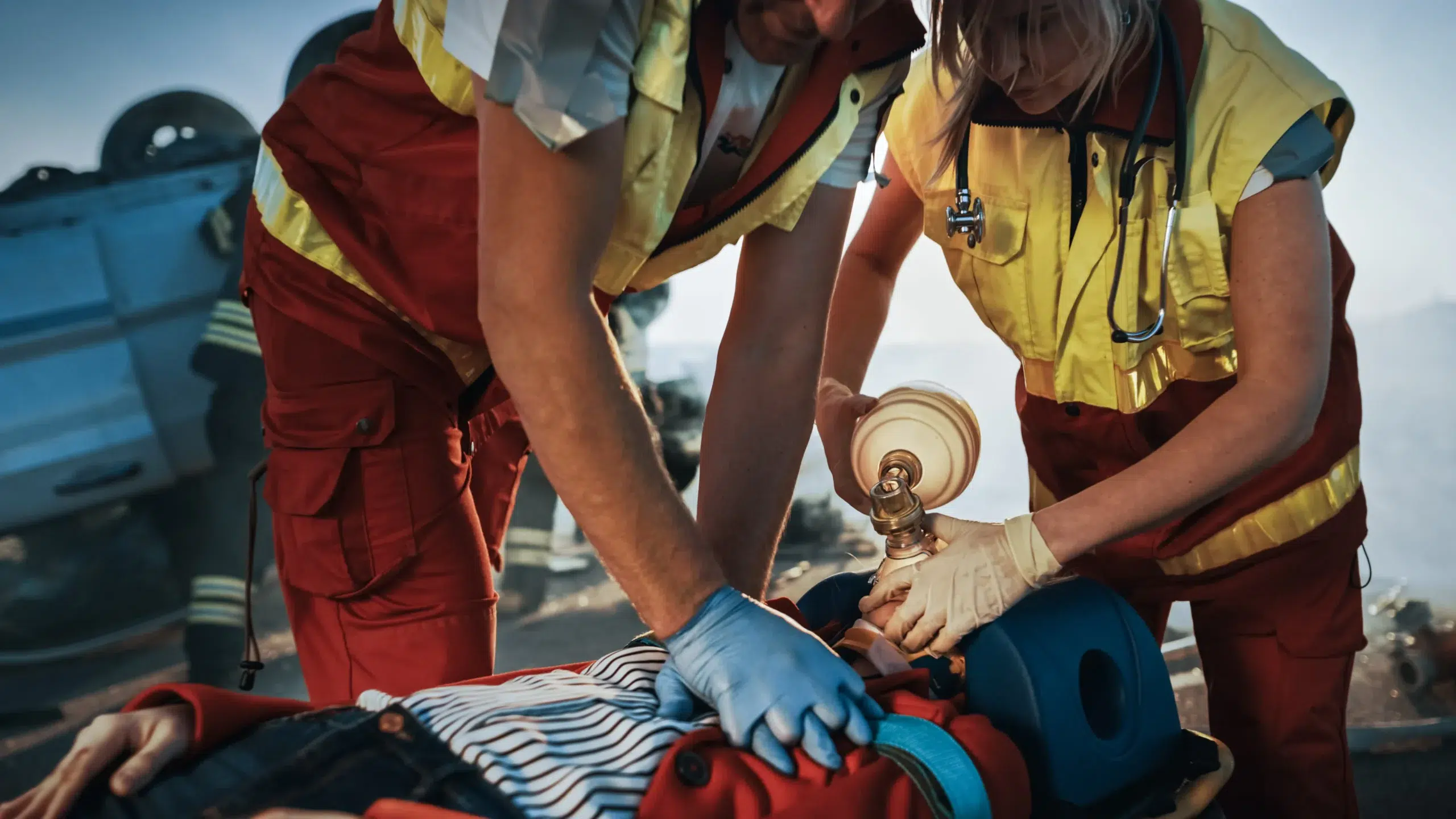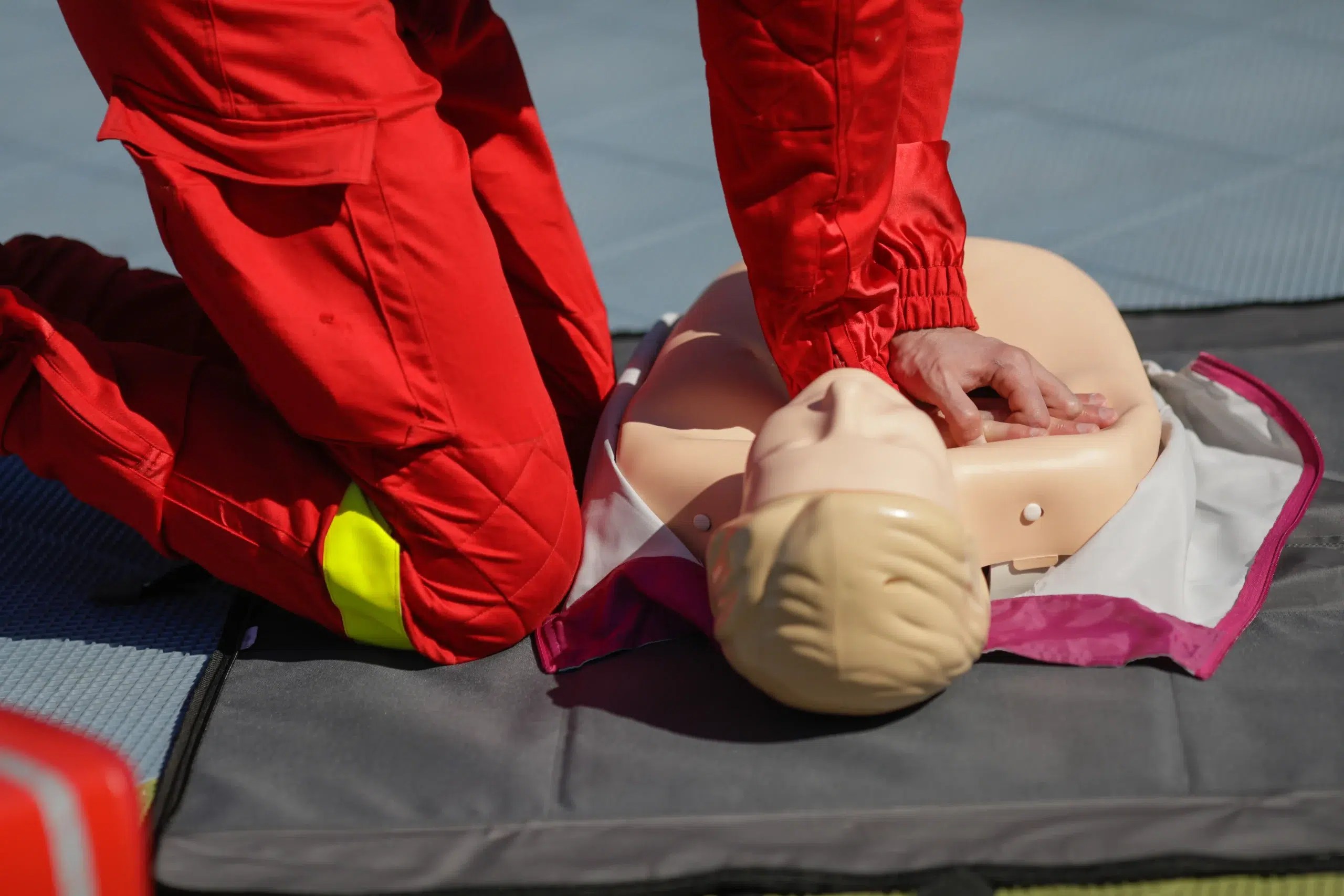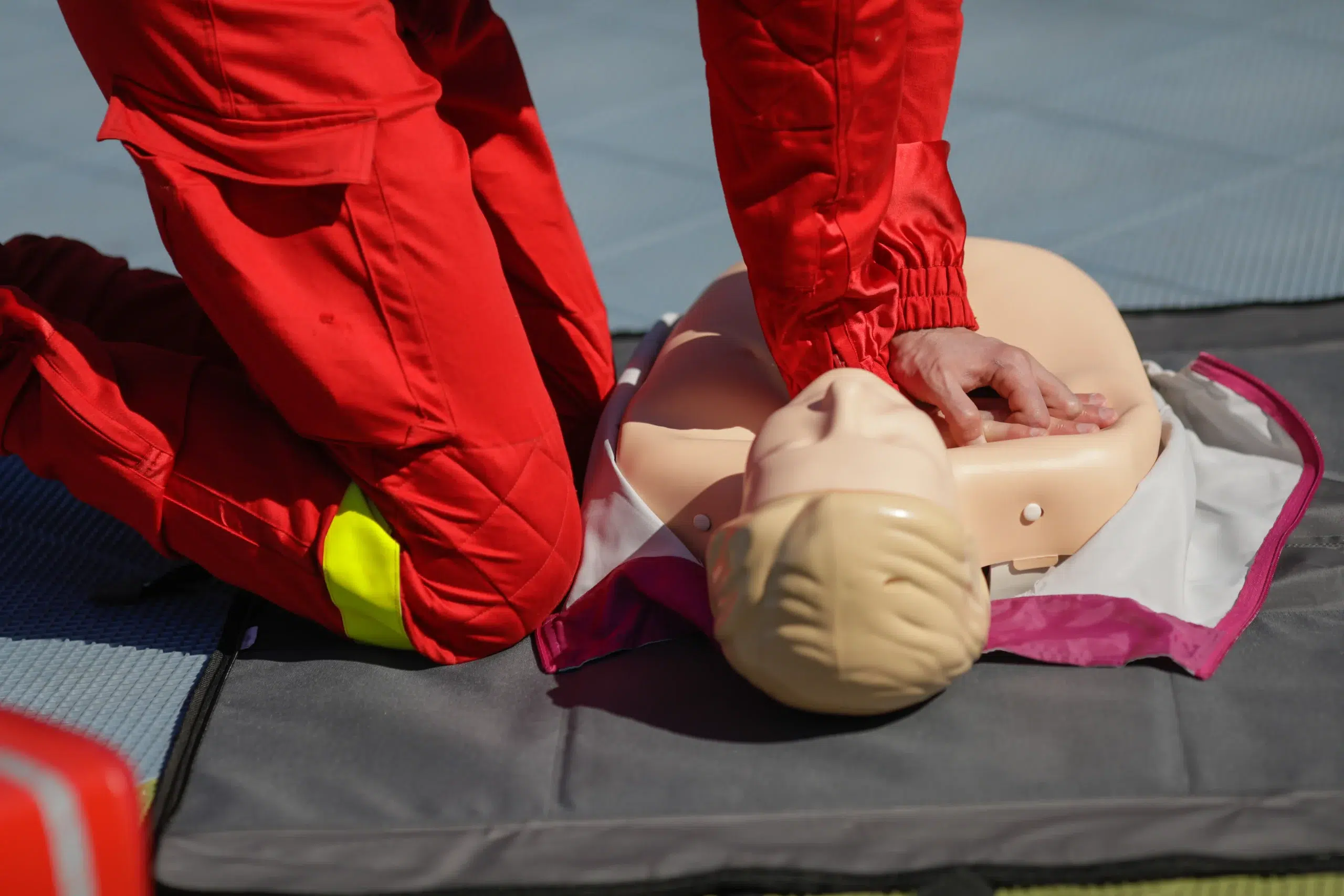CPR certification is more than just a credential; it’s a life-saving skill that empowers you to act in critical moments. This guide simplifies your search for the right San Jose CPR certification program. We’ll break down the different certification levels, from Basic Life Support (BLS) to Advanced Cardiovascular Life Support (ACLS) and Pediatric Advanced Life Support (PALS), explaining who they’re designed for and what they cover. We’ll also explore the costs, renewal processes, and the importance of hands-on training. Whether you’re a healthcare professional in San Jose required to maintain certification or an individual seeking to learn these vital skills, this guide will help you confidently choose the best San Jose CPR certification course for your needs.
Key Takeaways
- Find the right CPR certification level: Whether you’re a healthcare professional, caregiver, or simply want to be prepared, explore options from basic CPR to advanced certifications like ACLS and PALS.
- Select a trusted training provider: Look for established providers like Safety Training Seminars, offering a range of AHA-certified courses, convenient schedules, and various learning formats.
- Maintain your certification: CPR skills require regular renewal. Explore streamlined renewal courses and flexible options like the RQI program to stay up-to-date with the latest guidelines.
What is CPR Certification in San Jose?
CPR certification in San Jose gives you the skills to respond to cardiac emergencies. These courses teach life-saving techniques like chest compressions, rescue breaths, and how to recognize a heart attack or stroke. Many programs, like those offered at Safety Training Seminars, also include AED training. AHA compliance ensures the training meets national standards, preparing you to handle medical emergencies. Hands-on practice builds confidence, letting you apply these skills in real-world situations. This practical training is often a requirement for healthcare professionals and other jobs. For convenient recertification, online options like the RQI program offer a flexible way to maintain your credentials. Whether for personal or professional reasons, CPR certification is a valuable skill, empowering you to act in critical moments.
CPR Certification Types
Knowing which CPR certification is right for you can feel overwhelming, so let’s break down the different types and who they best serve. Each certification level builds upon the last, adding more advanced life-saving techniques.
Basic Life Support (BLS)
BLS certification is the foundation for any healthcare provider or first responder. This course teaches you how to recognize the signs of a cardiac arrest, perform high-quality CPR, and use an AED. It emphasizes the importance of early intervention and effective teamwork during emergencies. Safety Training Seminars offers AHA-certified BLS courses in San Jose, ensuring your training aligns with the latest guidelines. While essential for medical professionals, this course is valuable for anyone wanting to be prepared for a cardiac emergency.
Advanced Cardiovascular Life Support (ACLS)
ACLS certification goes beyond the basics of BLS, equipping healthcare professionals with the advanced skills to manage cardiovascular emergencies and other life-threatening situations. This course covers a broader range of interventions, including airway management, pharmacology, and effective team dynamics during resuscitation. If you’re a physician, nurse, paramedic, or other healthcare provider regularly responding to emergencies, the ACLS course at Safety Training Seminars in San Jose will give you the expertise to handle complex medical scenarios.
Pediatric Advanced Life Support (PALS)
PALS certification focuses on the specific needs of infants and children facing medical emergencies. This course equips healthcare providers with the knowledge and skills to recognize and respond to respiratory distress, cardiac arrest, and other pediatric emergencies. Register for a PALS course through Safety Training Seminars’ partnership with the AHA to ensure you’re prepared to provide effective care for younger patients.
First Aid/CPR/AED Certification
This combined certification provides a comprehensive approach to emergency response. You’ll learn essential first aid techniques for various injuries and illnesses, CPR skills for adults, children, and infants, and how to use an AED. This certification is ideal for anyone who wants to be prepared for emergencies, from teachers and coaches to parents and caregivers. Safety Training Seminars, a woman-owned AHA Training Center, offers this combined course in San Jose, making it convenient to gain these vital skills.
Top San Jose CPR Certification Providers
Finding the right CPR certification course can feel overwhelming, but several respected providers serve the San Jose area. Here’s a rundown of some popular options to help you in your search.
Safety Training Seminars
Safety Training Seminars offers a comprehensive range of American Heart Association (AHA) courses, including BLS, ACLS, PALS, CPR, and First Aid. They focus on providing convenient daily classes in San Jose and surrounding areas like Santa Clara and Sunnyvale. Check their website for course schedules and RQI program information. Their customer service team can answer any questions about certification options. The RQI program is a blended learning option for healthcare professionals seeking BLS, ACLS, and PALS certifications.
American Heart Association (AHA)
While the AHA doesn’t directly teach courses, they set the standards for CPR training. Many organizations, including Safety Training Seminars, are certified AHA Training Centers. Look for an AHA-compliant course to ensure high-quality instruction. The AHA’s RQI program is a popular choice for medical professionals because of its flexible online component and skills sessions.
American Red Cross
The American Red Cross is another well-known provider of CPR and First Aid training. Their San Jose location offers various courses that meet OSHA workplace safety standards. The Red Cross is a good option if you’re looking for a familiar and trusted name in safety training.
CPR Training Center
The CPR Training Center in San Jose offers AHA-certified courses in BLS, ACLS, PALS, and First Aid. They provide a convenient option for those seeking certification in the San Jose area. You can find more information about their course offerings online.
Local Community Colleges
Community colleges often offer affordable CPR certification courses to local residents. Check with colleges in your area, such as those in San Jose, for their program schedules. These can be a great option for students and those seeking budget-friendly training.
CPR Certification Costs & Value
Getting CPR certified is an investment in life-saving skills. Understanding the associated costs and recognizing the inherent value is an important first step. Let’s break down typical expenses, explore influencing factors, and uncover potential ways to save.
Average Certification Prices
CPR certification costs in San Jose, California, vary based on the course type and provider. Basic Life Support (BLS) certification, for example, often starts around $70. More advanced certifications like Advanced Cardiovascular Life Support (ACLS) and Pediatric Advanced Life Support (PALS) typically range from $140 to $200, especially for renewals. These prices generally align with American Heart Association (AHA) certified courses offered throughout the region. You can explore AHA BLS course options for specific pricing.
Factors Influencing Cost
Several factors contribute to the overall cost of CPR certification. Course format—in-person, online, or blended—plays a significant role. In-person courses often include hands-on training with certified instructors and equipment access, which can influence pricing. Course length also matters, ranging from two to over four hours depending on the material covered. The type of certification also influences the final cost, with more specialized certifications like ACLS and PALS generally priced higher than basic CPR and First Aid. For a comprehensive list of CPR and First Aid courses, check out our course calendar.
Discounts & Promotions
While cost is a factor, remember that these skills can be invaluable. However, there are often ways to reduce the financial burden. Check with your chosen provider for any ongoing promotions or discounts. We also encourage you to review our low price guarantee for the best possible value.
CPR Certification Duration & Renewal
Knowing how long your certification lasts and how to renew it is key to staying prepared for emergencies. This information helps you plan and ensures you’re always ready to provide assistance when needed.
Course Lengths
CPR course lengths vary depending on the format (in-person, online, or blended) and the material covered. Generally, courses run from about two to just over four hours. Safety Training Seminars offers a variety of course formats to fit your schedule. Visit their site for details on specific course lengths and schedules.
Certification Validity
CPR certifications, including those from the American Heart Association (AHA), are typically valid for two years. This standard reflects the evolving best practices in CPR. Staying current with the latest techniques ensures you can provide effective care in an emergency.
Renewal Process
Before your certification expires, you’ll need to take a renewal course. Safety Training Seminars offers streamlined renewal courses. They also provide shorter skills check sessions, often around 45 minutes, particularly helpful for busy healthcare professionals who have completed the online portion of a hybrid course. This flexible approach helps you maintain your certification. Check with your certifying organization or employer for specific renewal requirements.
Choose the Right CPR Certification Course
Finding the right CPR certification course requires a bit of research to ensure it aligns with your specific needs and learning style. Here’s a breakdown of key factors to consider:
Assess Your Needs
Before you start browsing courses, ask yourself a few questions. Why are you pursuing CPR certification? Are you a healthcare professional needing to maintain licensure? Or are you a concerned parent wanting to learn essential life-saving skills for emergencies? Identifying your “why” will guide you toward the right course. For instance, healthcare providers in San Jose often prefer the American Heart Association’s RQI program for its streamlined approach to BLS, ACLS, and PALS certifications. This program offers the flexibility busy professionals need while upholding rigorous training standards. If you’re not a medical professional, a standard CPR and First Aid course might be a better fit. Consider your current schedule and how much time you can realistically commit to training.
Compare Course Content
Not all CPR courses are created equal. While core skills remain consistent, the course content and format can vary. Some providers offer traditional in-person classes, while others incorporate online learning components or blended learning. Safety Training Seminars in San Jose, for example, provides a variety of courses to cater to different learning preferences. Look into the specifics of each course. What topics are covered? What’s the balance between theory and hands-on practice? Understanding these details will help you choose a course that matches your learning style and provides the specific skills you’re looking for. Also, remember that most certifications are valid for two years, so factor in the renewal process when making your decision.
Evaluate Provider Reputation
Choosing a reputable provider is crucial for a valuable learning experience. Look for established organizations with a track record of quality instruction. Safety Training Seminars, a woman-owned AHA Training Center, has earned a solid reputation in San Jose for its comprehensive CPR, BLS, ACLS, PALS, and First Aid training. Reading reviews from past participants can offer valuable insights into the quality of instruction, course materials, and overall experience. A provider’s reputation speaks volumes about their commitment to delivering effective training and equipping you with the confidence to act in emergencies. Don’t hesitate to ask for recommendations from friends, colleagues, or healthcare professionals in your network.
CPR Certification Importance in Healthcare
CPR certification is crucial in healthcare, impacting everything from patient outcomes to a healthcare provider’s confidence. Let’s explore why.
Critical Skills Gained
CPR certification equips healthcare professionals with the skills to respond effectively to cardiac arrest and other respiratory emergencies. These skills go beyond chest compressions and rescue breaths. High-quality CPR training, like the American Heart Association’s RQI program offered at Safety Training Seminars, emphasizes early recognition of a cardiac event, activating the emergency response system, and effective teamwork during resuscitation. The RQI program offers a streamlined approach to maintaining these skills through online learning and in-person skills sessions. Learn more about our BLS, ACLS, and PALS certification courses.
Regulatory Compliance
Many healthcare organizations and regulatory bodies require CPR certification. This requirement recognizes CPR as a fundamental skill in healthcare. Completing a CPR course that meets OSHA requirements demonstrates a commitment to patient safety and professional standards. Safety Training Seminars ensures all our CPR classes meet these regulations. We also offer blended learning options for busy healthcare schedules.
Improved Confidence & Team Coordination
CPR certification fosters confidence and improves team coordination. Knowing how to respond in a crisis reduces anxiety and empowers healthcare professionals. Effective CPR often requires a coordinated team effort, and training reinforces the importance of clear communication and defined roles. Safety Training Seminars focuses on a supportive learning environment to build confidence and encourage active participation, leading to better information retention and improved teamwork during real-life emergencies. Check out our low price guarantee.
Online vs. In-Person CPR Certification
Choosing between online and in-person CPR certification depends on your learning style, schedule, and specific requirements. Both options offer distinct advantages and disadvantages. Let’s break down the pros and cons to help you make the best decision.
Pros & Cons of Each
Online CPR courses offer unparalleled flexibility. You can learn at your own pace, fitting the training around your busy schedule. This convenience makes online learning attractive for professionals, students, and caregivers. However, online-only CPR training typically doesn’t meet Occupational Safety and Health Administration (OSHA) requirements for workplace certification, which often mandate hands-on training. In-person classes excel in this area, providing the practical experience necessary for many workplaces and industries, especially those with potential hazards or located far from hospitals. In-person CPR training allows for immediate feedback and personalized instruction from a certified instructor. This direct interaction can be incredibly beneficial for mastering essential techniques.
While online courses may offer video demonstrations, they sometimes lack the real-time correction and guidance available in a classroom setting. If you thrive in a structured environment and value direct interaction, in-person training might be a better fit. However, in-person classes require a greater time commitment, as you need to attend scheduled sessions, which may not be feasible for everyone. Consider your learning preferences and schedule when making your decision.
Blended Learning
Blended learning offers a smart compromise, combining online learning flexibility with the hands-on practice of in-person training. You can complete the cognitive components of the course online at your convenience, then attend an in-person session to practice your skills and complete the required skills assessment. The American Red Cross offers blended learning CPR courses, allowing you to tailor your learning experience to your needs. This approach is particularly effective for those who prefer a self-paced learning environment but also recognize the importance of hands-on training. The Resuscitation Quality Improvement (RQI) program is another blended learning option, combining online learning with regular in-person skills assessments to maintain competency.
Hands-On Skills Assessment
Regardless of your chosen learning format, a hands-on skills assessment is crucial for CPR certification. This practical test ensures you can effectively perform CPR in a real-life emergency. OSHA standards often require this hands-on component for workplace compliance. During the assessment, a certified instructor will evaluate your ability to perform chest compressions, rescue breaths, and other essential CPR techniques. Many training centers, including those offering CPR classes in San Jose, provide same-day certification upon successful completion of the skills assessment. This allows you to leave the class with your certification, ready to respond to emergencies.
CPR Certification Instruction Quality & Experiences
When your health is on the line, you want to know the person performing CPR is well-trained. Choosing a CPR certification course with experienced instructors and comprehensive content is crucial. Here’s what to consider:
Instructor Expertise & Methods
Experienced, certified instructors bring real-world knowledge to the classroom. At Safety Training Seminars, our American Heart Association-certified instructors use proven teaching methods that combine lectures, demonstrations, and hands-on practice. This approach ensures you learn the techniques and gain the confidence to use them effectively. As a woman-owned business, we’re committed to providing high-quality instruction for all our courses, including BLS, ACLS, PALS, CPR, and First-aid training in San Jose.
Course Content & Delivery
A good CPR certification course covers essential life-saving techniques and adheres to the latest guidelines. Our comprehensive courses align with the American Heart Association’s standards. We offer various learning options, including the popular RQI program for medical professionals seeking a flexible way to maintain their certifications. Whether you choose a traditional classroom setting or our convenient online option, you’ll develop the skills to respond effectively in an emergency. Our San Jose classes cover everything from the basics of CPR to more advanced techniques.
Past Participant Feedback
Positive feedback from past participants offers valuable insights into a program’s quality. We’re proud of the positive reviews we receive, with students consistently praising our instructors’ knowledge, the comfortable learning environment, and the effectiveness of our training. Check out our student reviews to see what others say about their experience with Safety Training Seminars. We’re confident you’ll find our courses informative, engaging, and empowering.
Prepare for Your CPR Certification Course
Getting ready for your CPR certification course can make a big difference in how well you absorb the information and perform the skills. Here’s what you should know to feel confident and prepared:
What to Expect
The American Heart Association RQI (Resuscitation Quality Improvement) program offers a streamlined path to certification for medical professionals. It’s the most common way healthcare providers in San Jose maintain their BLS, ACLS, and PALS certifications. Expect a combination of online learning and in-person skills sessions when you sign up for an RQI course through Safety Training Seminars. You can find their course schedule and register for a course on their website. They also offer other CPR and First Aid courses, and you can view the schedule and register online.
Study Materials & Resources
Safety Training Seminars provides students with the materials needed to succeed. All courses meet OSHA requirements, and you’ll have access to online resources, manuals, and refresher activities. This blended learning approach reinforces concepts and allows you to learn at your own pace. Reviewing these resources before your in-person skills session can give you a head start.
Tips for Success
Think about how you learn best. If you thrive in a structured classroom environment, an in-person course might be a good fit. If you prefer flexibility, explore online or blended learning options. Regardless of the format, look for a CPR course that combines online learning with hands-on practice. This approach not only meets OSHA requirements but also ensures you’re fully prepared to use your skills in a real-life emergency. Reviewing the materials beforehand and coming prepared with questions will help you get the most out of your training. Safety Training Seminars offers a low price guarantee, giving you confidence that you’re getting a great value.
Related Articles
- CPR & First-aid Classes in San Jose, CA – San Jose CPR Classes
- BLS CPR Classes in San Jose, CA – San Jose CPR Classes
- AHA ACLS Classes in San Jose, CA – San Jose CPR Classes
- AHA PALS Classes in San Jose, CA – San Jose CPR Classes
- CPR, BLS, ACLS, PALS, & First-aid Courses in San Jose, CA
Frequently Asked Questions
What’s the difference between BLS, ACLS, and PALS? BLS (Basic Life Support) teaches fundamental CPR and AED use for any rescuer. ACLS (Advanced Cardiovascular Life Support) builds upon BLS, adding advanced techniques for healthcare professionals managing cardiovascular emergencies. PALS (Pediatric Advanced Life Support) focuses on the specialized care of infants and children in emergencies.
How do I choose the right CPR certification course? Consider why you need CPR certification. Are you a healthcare provider, a student, or someone wanting general knowledge? Your reason will guide your choice. Also, think about your learning style. Do you prefer online learning, in-person classes, or a blend of both? Finally, check the provider’s reputation and course content to ensure it aligns with your needs. Safety Training Seminars offers various options, including the RQI program for healthcare professionals.
How long is CPR certification valid, and how do I renew it? Most CPR certifications are valid for two years. Renewal involves taking another course before your current certification expires. Check with your certifying organization or employer for specific requirements. Safety Training Seminars offers streamlined renewal courses, including shorter skills check sessions for those who’ve completed online coursework.
What are the benefits of online vs. in-person CPR training? Online CPR training offers flexibility, allowing you to learn at your own pace. In-person classes provide hands-on practice and direct feedback from an instructor. Blended learning combines the benefits of both, offering online coursework and in-person skills sessions. Consider your learning style and schedule when deciding which format is best for you.
What should I expect during a CPR certification course? Expect a combination of instruction and hands-on practice. You’ll learn how to recognize emergencies, perform CPR, and use an AED. Most courses include a skills test to ensure you can perform the techniques correctly. Reviewing any provided study materials beforehand can be helpful.


